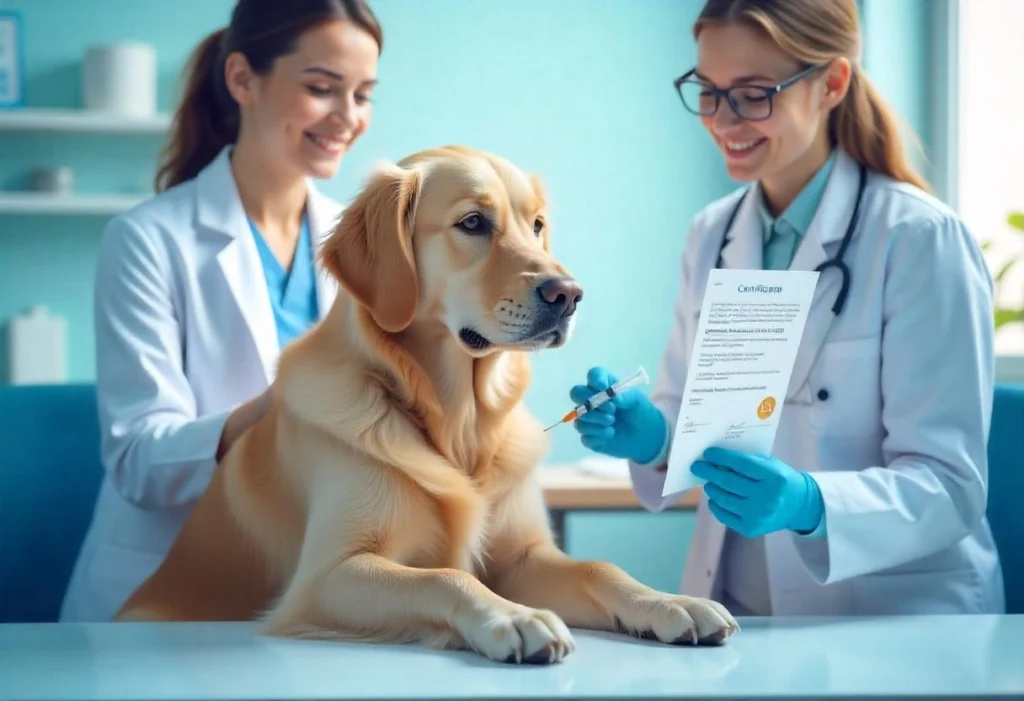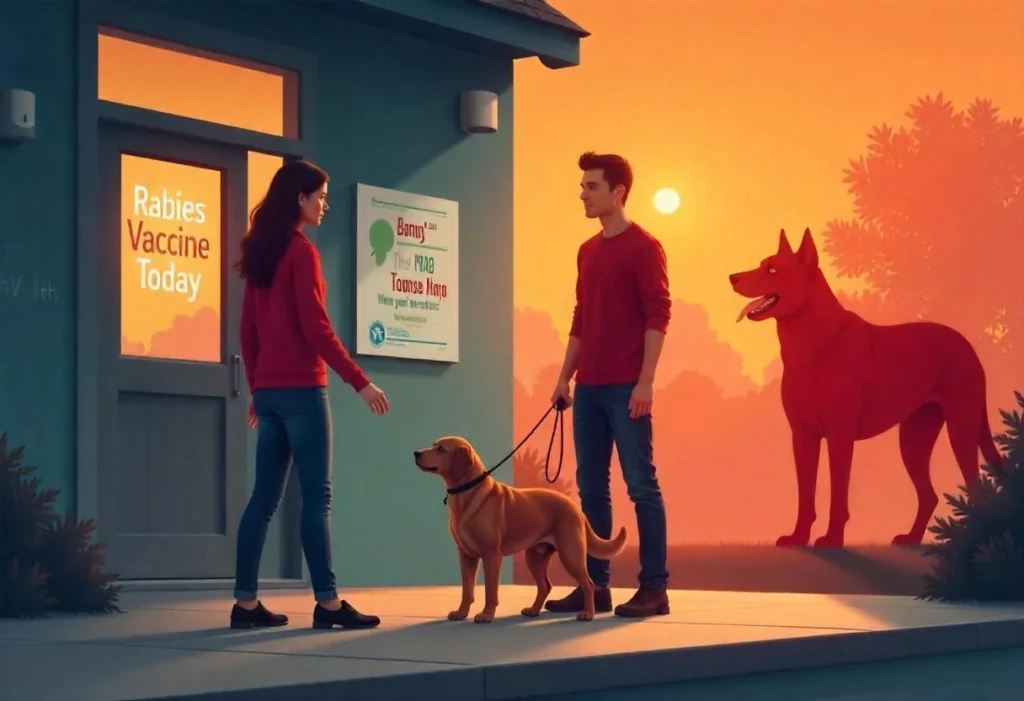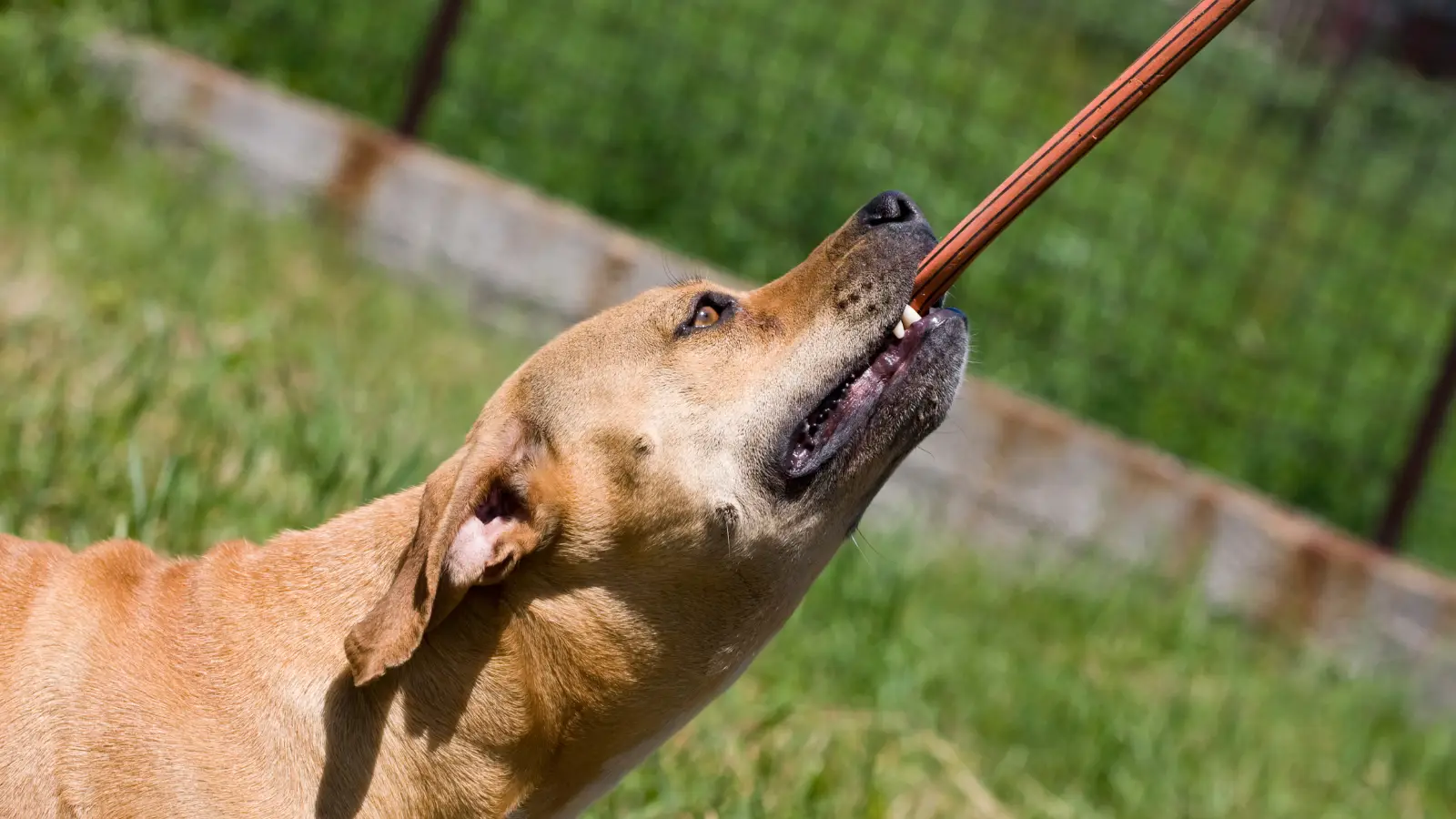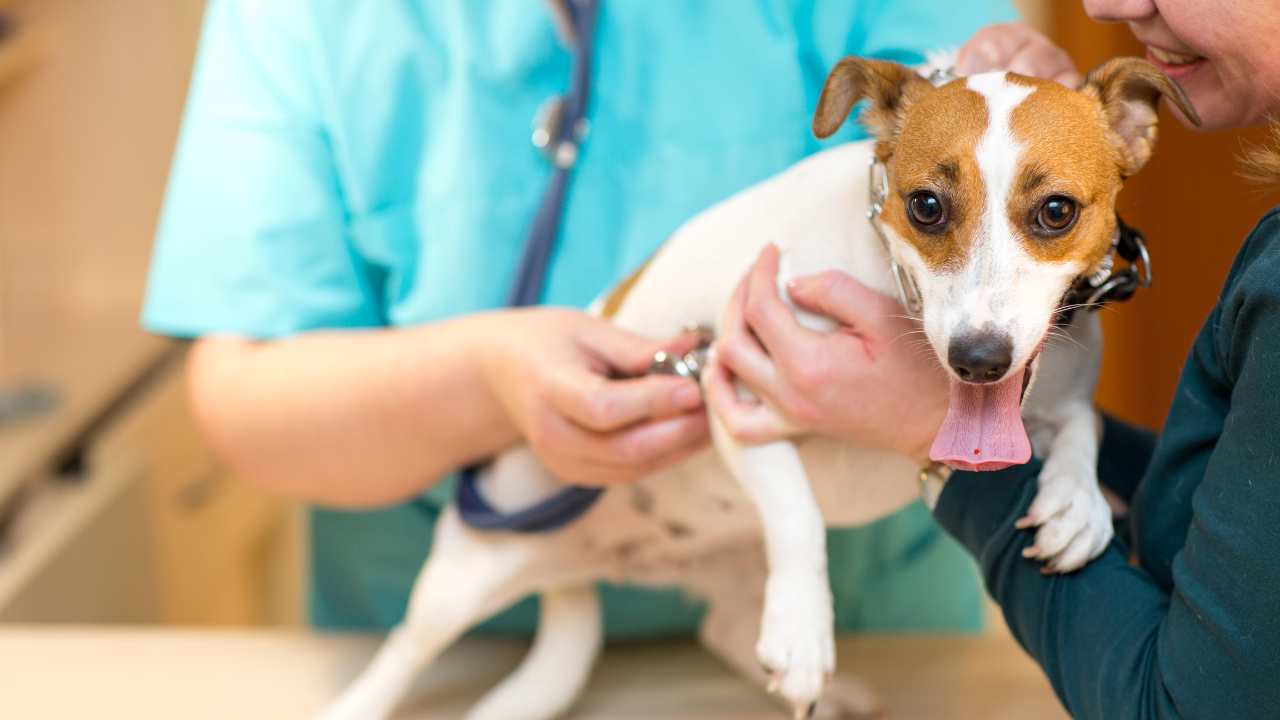
Rabies Shot for Dogs: A Complete Guide.
As a loving fur parent, you would like to protect your dog from any harm. One of the most Important measures toward his health is to ensure he stays rabies vaccinated. Your responsibility is not just for your dog’s protection; it’s also for other animals and human beings. That’s why rabies shot for dogs are important.
Rabies is a very dangerous infection that can affect dogs and cats. It acts on the nervous system, and if untreated thereafter, it can lead to death. It spreads through the infected saliva of animals in the situation of a bite or scratch. Rabies are quite rare these days, but it still exists. The right and best way to keep your dog safe are to keep him vaccinated.
So the question is, how often does your dog need a rabies shot? This depends on your location, the type of rabies vaccine your vet recommends, and the health status of your dog. Some cities require yearly shots, while others recommend once every three years.
As an experienced pet owner for many years, I have found that staying apprised of rabies shots gives you the peace of knowing that your dog is that much safer. Now let’s go down the details and make sure you’re doing the very best for your furry friend!
What Is Rabies and Why Is It Dangerous for Dogs?
- What is Rabies?
- Rabies is a virus that affects the brain and nervous system of mammals, including dogs. Once it takes hold, it can cause serious health problems and, if left untreated, death.
- How Does Rabies Spread?
- The virus spreads mainly through saliva, most commonly when an infected animal bites another animal. A wild animal like a raccoon, bat, or another infected dog can give a dog rabies through a bite.
- Why Is Rabies Dangerous for Dogs?
- Rabies is incredibly dangerous because it messes with your dog’s behavior and physical abilities. Early signs might include aggression, drooling, or trouble swallowing. As it progresses, it can cause paralysis, seizures, and eventually, death. Once symptoms appear, there’s no cure.
- The good news is that rabies is preventable. Vaccinating your dog is the best way to keep them safe. Keeping their rabies shots up to date can save their life and protect them from this deadly disease.

The Rabies Shot for Dogs
As a dog owner, I can’t stress enough how important the rabies shot is. It’s a simple way to protect your dog from a potentially deadly disease. Here’s why it’s so crucial and how it works.
How the Rabies Shot Works
The rabies Shot trains your dog’s immune system to fight off the virus before exposure. It acts as a shield, stopping the virus from damaging the brain and nervous system. In my experience, the vaccine is safe, with rare side effects like mild soreness or tiredness at the injection site, but these usually go away quickly.
Types of Rabies Shot for Dogs
There are two types: The one-year vaccine and the three-year vaccine. The one-year vaccine is often given to puppies or if your dog’s vaccination is overdue. It lasts a year, so your dog will need a booster shot. The three-year vaccine protects for three years, meaning fewer trips to the vet. Both vaccines offer the same level of protection—it’s just a matter of how long they last.
Getting your dog vaccinate against rabies is an easy way to keep them safe and healthy. If you’re unsure when to get the vaccine, your vet can guide you.
Rabies Vaccine Schedule
| Vaccine Type | Recommended for | Protection Duration | Common Factors for Choice |
| One-Year Vaccine | Puppies, Dogs with expired vaccines, Extra care needed | 1 Year | Age, Health Condition, Local Law |
| Three-Year Vaccine | Most Adult Dogs after first vaccination | 3 Years | Age, Health Condition, Local Law |
I’ve provided a chart outlining the differences between the one-year and three-year rabies vaccines. It highlights the recommended dog types, protection duration, and factors that determine the best vaccine choice. This can help you better understand which vaccine might be right for your dog based on factors like age and health. If you have any more questions, feel free to ask!
Factors Affecting the Frequency of Rabies Shots for Dogs
As a dog owner, I’ve learned that several factors influence when my dog needs a rabies shot. Here’s a breakdown:
- Age and Health:
- Puppies get their first rabies shot between 12-16 weeks old.
- Older dogs might need extra consideration, especially if they have health issues.
- Health conditions can affect how often your dog needs a shot.
- Breed Considerations:
- Some dog breeds are more sensitive to vaccines and health conditions.
- Larger breeds might need closer monitoring as they age.
- Smaller breeds might also need extra care, so talk to your vet for a tailored vaccination plan.
- Vaccination History:
- If your dog misses a scheduled shot, make sure to follow up with the vet immediately.
- Missing a vaccine could put your dog at risk, so a quick follow-up might be necessary.
These factors ensure that your dog stays protected, so don’t hesitate to consult your vet to keep your furry friend safe and healthy.

Signs That Might Need a Rabies Shot for Dog
As a pet owner who’s been through it all, I know how easy it is to forget a vet appointment or overlook a vaccine. But when it comes to rabies, there are a few signs that should make you pause and think, “Does my dog need another shot?”
Missed Appointments
One of the most common reasons your dog might need a rabies shot is simply missing an appointment. Life gets busy, and sometimes those vaccination reminders slip through the cracks. If you miss a scheduled rabies shot, it’s important to get your dog back on track as soon as possible. Delaying the vaccination can leave your dog vulnerable, and rabies is such a dangerous disease that you don’t want to risk it. If you realize you’ve missed a shot, don’t wait—schedule that vet appointment and get things back on track. A simple boost in protection can save your dog’s life.
Local Outbreaks
Another important factor is the risk of local rabies outbreaks. If there has been an increase in rabies cases in your area, your vet might recommend getting your dog vaccinated sooner than expected. This can happen especially if there’s a rise in wild animal cases, like raccoons or bats, in the neighborhood. If you live in an area where rabies is more common, you might need to stay more vigilant about vaccination schedules. Pay attention to news or warnings in your area and talk to your vet if you think an extra shot might be necessary for your dog’s safety.
Health Conditions
If your dog has any health conditions or a weakened immune system, it might need a different vaccination schedule. Dogs with compromised health can be more vulnerable to infections, so your vet may suggest a tailored approach to keep them protected. For instance, if your dog is older, has certain illnesses, or is undergoing treatment, it’s important to talk to your vet about how often they should get a rabies shot. A personalized plan will make sure your dog stays safe while keeping their health in mind.
If you’re ever in doubt, your vet is your best resource. They’ll help you decide the right schedule based on your dog’s health, the area you live in, and any missed appointments.
What Happens if a Dog Doesn’t Get Rabies Shots?
As a dog owner, it’s easy to overlook things sometimes—appointments get missed, and life gets busy. But when it comes to rabies, the stakes are high, and the consequences of skipping a vaccination can be serious. Let me explain what can happen if your dog doesn’t get their rabies shots.
Legal Implications
Depending on where you live, not vaccinating your dog against rabies can come with some pretty severe legal consequences. In many areas, rabies vaccinations are mandatory. If your dog is caught without the proper shots, you could face fines or even legal action. Some places take it very seriously, and failing to vaccinate might result in a penalty or a court order to have your dog quarantined. Not only is it risky for your dog, but it could also put you in a difficult situation with local authorities. It’s just easier to stay ahead of the game and keep your dog’s vaccination up to date.
Health Risks for Your Dog
If your dog doesn’t get the rabies vaccine, they’re at risk of contracting a disease that is almost always fatal once symptoms appear. Rabies attacks the brain and nervous system, and once those signs start showing, there’s no cure. It’s terrifying to think about, but without vaccination, your dog has no protection. I’ve seen it happen in rare cases, and it’s heartbreaking. Keeping up with rabies vaccinations gives your dog the best shot at a long, healthy life.
Community Health Risks
Unvaccinated dogs don’t just put themselves at risk; they can also pose a danger to other pets and even humans. Rabies is highly contagious and can spread through bites or saliva. If your dog were to bite or come into contact with another animal or person, they could transmit the virus. In a worst-case scenario, rabies could endanger the entire community. That’s why vaccination is not just for your dog’s health—it’s also a responsibility to those around you.
If you ever have doubts about the rabies vaccine or when to schedule your dog’s shots, I’d recommend talking to your vet. It’s always better to stay ahead of it, for the health of your dog and the safety of everyone else.
FAQ’s
The rabies vaccine is effective for either one year or three years, depending on the type your dog receives. Your vet will guide you on when to schedule the next shot based on your dog’s vaccination history.
If you miss your dog’s rabies shot, it’s important to schedule a booster as soon as possible. Your vet will advise on how to get back on track and ensure your dog is protected.
A dog needs rabies shots either annually with the one-year vaccine or every three years with the three-year vaccine. Follow your vet’s recommendations and local laws regarding vaccination schedules.
While rare, no vaccine is 100% effective, and a vaccinated dog could still contract rabies if exposed to the virus. It’s important to keep vaccinations up to date to minimize this risk.
Most dogs tolerate the rabies shot well, with only mild soreness or discomfort afterward. The pain is typically short-lived, and your dog will usually be back to normal in a day or so.
Common side effects include mild soreness at the injection site, tiredness, or a slight fever, all of which usually pass quickly. Serious reactions are rare but should be reported to your vet immediately if they occur.
Getting rabies shots too often can stress your dog’s immune system, but if you follow the recommended schedule, this won’t be an issue. Always check with your vet if you’re unsure about your dog’s vaccination timeline.
It’s not a good idea to delay your dog’s rabies vaccination, as this leaves them vulnerable to the virus. If you miss a shot, schedule a booster as soon as possible to ensure your dog remains protected.
I use my phone’s calendar to set a reminder a month before the vaccine is due. You can also use pet health apps that send notifications, or even ask your vet to send a reminder when it’s time for the next shot. Having this system in place makes it easy to stay on top of things and avoid last-minute stress.
As a dog owner, I know how easy it is to lose track of important dates. Here are a couple of simple ways I make sure my dogs stay up-to-date on their rabies shots.
I keep my dog’s vaccination records in a safe spot, like a folder or digital file, for easy access. This way, I always know when the next shot is due and have the records ready if I ever need them, whether for a vet visit or travel.
These small steps have helped me keep my dogs safe and ensure they never miss a rabies shot.
Conclusion
Keeping your dog’s rabies vaccinations up to date is one of the simplest yet most important things you can do as a pet owner. Not only does it protect your dog from a fatal disease, but it also keeps the community safe from the spread of rabies. Delaying or neglecting these shots can lead to serious legal consequences, health risks for your dog, and potential harm to other pets and people around you. Trust me, staying on top of this isn’t just a task—it’s a way to keep your furry friend healthy and safe for years to come.
If you’re not sure when your dog’s next rabies shot is due, don’t hesitate to reach out to your vet. They’ll be happy to help you stay on track and ensure your dog is protected. I encourage you to leave a comment or share your own experiences with rabies vaccinations—let’s help each other keep our dogs safe!




8 Comments
It’s truly very complex in this active life to listen news
on TV, thus I just use the web for that purpose, and get
the newest information.
When I originally commented I seem to have clicked the -Notify me when new comments are
added- checkbox and now whenever a comment is added I recieve four emails
with the same comment. There has to be a means you are
able to remove me from that service? Appreciate it!
I read this paragraph fully regarding the comparison of
newest and previous technologies, it’s awesome article.
Howdy outstanding website! Does running a blog such as this take a great deal of work?
I’ve no knowledge of programming however I had been hoping to start my own blog in the near future.
Anyways, should you have any ideas or techniques for new blog owners please share.
I know this is off topic but I just had to ask. Thank you!
Sure, I can share with you few ideas, if you want to know plrease contact with me
Thanks designed for sharing such a good thinking, piece of writing is nice, thats why i have read it completely
After looking into a number of the blog posts on your web page,
I really like your way of blogging. I book-marked it to my bookmark
website list and will be checking back in the near future.
Please visit my website as well and let me know what you think.
Thanks for the appreciation, What is your website name?